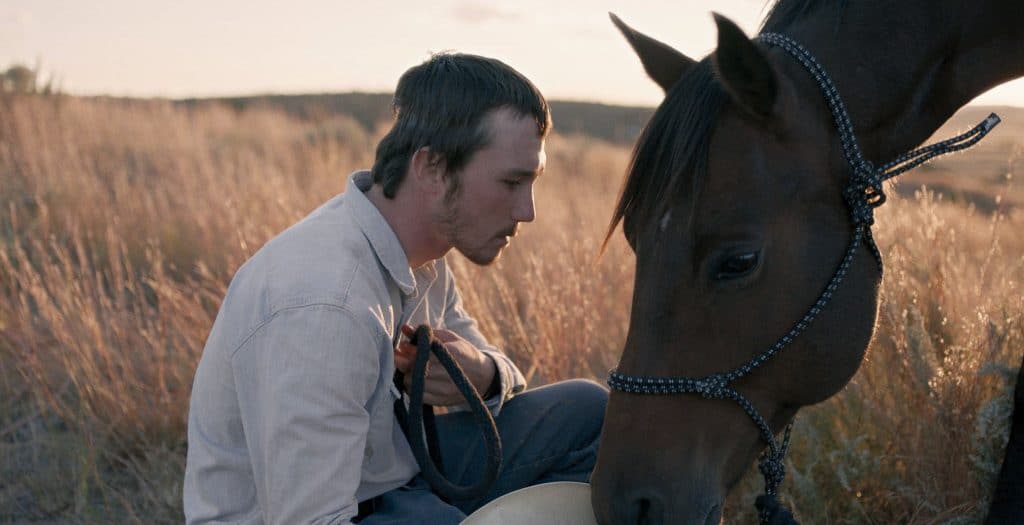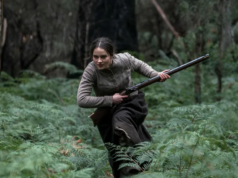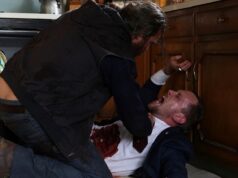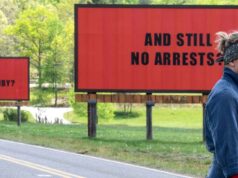Despite lacking in dramatic intensity like its non-professional leading actor, The Rider is a perceptive character study that blends fact and fiction
The Rider (2017)
Written and directed by Chloé Zhao. Starring Brady Jandreau, Tim Jandreau, Lilly Jandreau, Cat Clifford, Terri Dawn Pourier, Lane Scott, Tanner Langdeau and James Calhoon.
While researching for her debut feature film Songs My Brother Taught Me (2015) in the badlands of South Dakota, Chinese director Chloé Zhao came across a handsome rodeo bronc rider named Brady Jandreau who worked at a ranch and began to teach her how to ride a horse. At first, Zhao wanted to include Jandreau in one of her films, but it was only after the rider suffered a serious head injury falling from a horse that she decided to write and direct a drama based on his real-life experience with Brady playing the role of himself — or in fact a character based on himself.
The result is the quietly perceptive The Rider, a critically-acclaimed character study that re-examines masculinity in contemporary, post-Western times. When the film begins, Brady Blackburn (Jandreau) is recovering from a fall off a horse that left him gravely injured with a skull fracture and a metal plate inserted into his head. Living in poverty with his drunken father Tim (Wayne Jandreau) and his younger sister Lilly (Lilly Jandreau), who has Asperger’s, Brady sees an impairment of the motor functions in his right hand and is prone to vomiting and seizures. According to his doctor, he should no longer ride, or else the seizures will get worse and that may lead to terrible consequences — like what happened to Brady’s friend Lane (Lane Scott), who lives in a care facility after a similar accident.
Using non-professional actors playing close versions of themselves, Zhao creates a naturalistic film in which the line separating reality and fiction is nearly dissolved. The experience, in the best tradition initiated by Robert J. Flaherty in Nanook of the North (1922), is akin to watching a genuine documentary. As Brady tries to get back to his life prior to the accident, we see him tend to his beloved horse Gus, engage in trivial conversations with his father and sister (in a way that feels largely improvised) and later start in a new “temporary” job at a supermarket due to their financial problems (they are two months behind with the rent after Tim wasted their money in booze and gambling). In this place, nothing can be more devastating for a horse rider of relative renown than ending up as a farmer, as happens to so many.
The film’s narrative structure is linear and centered more on actions than on words. It is through what happens that we observe the growing frustration and depression of this virile man who is now forced to face his own vulnerability. As the skilled horse trainer that he is, Brady manages to “break” a wild horse but struggles to do the same with his chaotic, unbridled life. Even more ironic, however, is how he ends up having to sell his saddle in order to buy another horse, or how a sacrificed animal mirrors a reckless decision that might lead him to that same end. But despite all that, Zhao’s structure also proves to be a bit dry, moving schematically from one situation to the next in a way that feels mechanical and repetitious sometimes, almost as though we are reading a script.
And while Zhao and her cinematographer Joshua James Richards keep us as close as possible to Brady with their constant use of close-ups and shallow focus, the director’s approach comes off as restrained and dry as well, not exactly allowing us to connect with her character. For a film based on a real story, it doesn’t always feel authentic. Part of the blame is Jandreau’s, who is not a professional actor and lacks the acting scope and dramatic intensity to convey Brady’s whole sadness (just pay attention to the scene in which he struggles to cry while driving a car).
But in the end, as a certain character tells Brady not to give up on his dreams — despite being himself a living mirror of where Brady might end up — it becomes hard not to praise The Rider for the complex discussion it provokes, making us wonder which decision is the lesser of two evils after all.
When the film ends, we still wonder.





